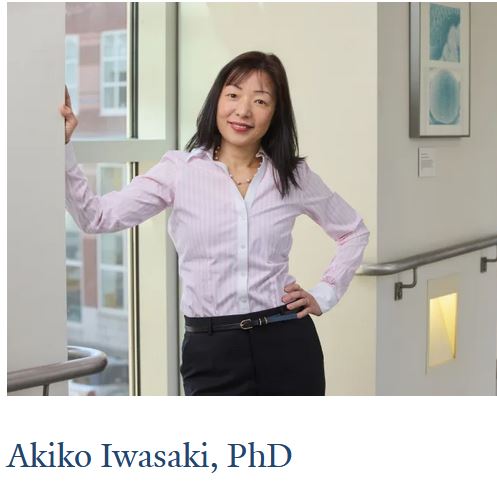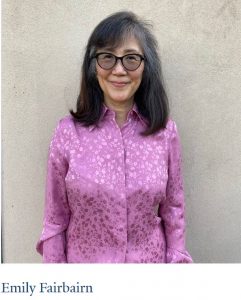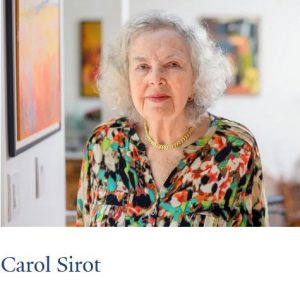Yale researcher seeks biomarkers for long COVID, chronic Lyme, and ME/CFS

by Julia Chianelli, Yale School of Medicine
On January 5, 2023, Anna (a pseudonym to protect her family’s privacy) got up early in the morning, took her mom’s car, and drove to a local state park where she ended her life. She was 40 years old and a mother of two children, ages 3 and 6.
Anna had suffered from long COVID after contracting COVID-19 in January 2022. She was diagnosed two months later with myalgic encephalomyelitis/chronic fatigue syndrome (ME/CFS).
ME/CFS is a disabling, chronic condition that affects the nervous and immune systems. Sometimes called an invisible disease, ME/CFS is often misunderstood and not taken seriously by some health care providers and the public.
Anna was confined to her bed due to her extreme exhaustion, pains, and tremors from ME/CFS. As her disease progressed, she could barely move, lost her ability to speak, and could not tolerate light or sound. Her pervasive brain fog made it difficult to think. ME/CFS crippled her mentally and emotionally.
From hope to despair
“Anna went from being hopeful, to somewhat hopeful, to despair and sadness,” recalls her mother.
During Anna’s last two months, signs were posted on her bedroom walls to communicate her needs: “Water,” “Food,” “Too Cold,” “Too Hot,” and “No Energy to Do That.”
The only times that she could see her children were when her husband would ask them to say good morning to her. Health care professionals from whom she sought treatment dismissed her symptoms.
Her mother came to the following conclusion about the medical community’s attitude toward Anna’s condition: “Since the disease is not quantitative, we can’t measure it. If we can’t test for it, then we can’t cure it.”
Anna lost her independence when she had to rely on family members to provide her with 24/7 care. “Anna didn’t want to go through life being an emotional, physical, and financial burden on our family,” says her mother.
The suicide rate among ME/CFS patients has grown at an alarming rate. According to research in Britain and Spain, people suffering from ME/CFS are six times more likely to die by suicide than the general population. In sharing Anna’s story, her mother hopes that research can someday discover a cure for ME/CFS.
Investing in research
Earlier this year, philanthropist Emily Fairbairn awarded $2 million to Yale School of Medicine to fund the research of Akiko Iwasaki, PhD, Sterling Professor of Immunobiology and professor of dermatology, of molecular, cellular & developmental biology, and of epidemiology (infectious diseases), on Long COVID and chronic Lyme disease, and Carol Sirot gifted $1 million to the school to help Iwasaki discover a biomarker for ME/CFS.
According to the Centers for Disease Control and Prevention (CDC), following the onset of the COVID pandemic, as many as one in 10 infected people are developing Long COVID, in which symptoms persist for weeks, months, or years post-infection. And while Long COVID can affect anyone—from infants to the elderly—there is a significant prevalence among women between the ages of 30 and 50.
The National Institutes of Health (NIH) funded $1.15 billion for Long COVID research, but many feel this amount is insufficient. NIH support for investigations of ME/CFS is also seen as modest, even though between 836,000 and 2.5 million adults in the United States are estimated to suffer from ME/CFS, according to an Institute of Medicine Report, with annual health care costs and lost productivity to be between $17- and $24 billion.
Long COVID focused a spotlight
“Long COVID has put a spotlight on existing diseases such as ME/CFS and chronic Lyme disease, which have been traditionally and historically ignored until very recently,” says Iwasaki.
“The pandemic has led to further research into them. The new public awareness of these diseases is partly because Long COVID is occurring simultaneously in 75 million people globally. Long COVID has taught the world that these diseases are real, and we need to study them. People are spreading disinformation about Long COVID, and it detracts from research. ME/CFS and Long COVID are related. Up to 50 percent of people will get ME/CFS after having Long COVID.”
Iwasaki’s research work discovered that in some patients with Long COVID, increased levels of antibodies to viruses such as the one that causes Epstein-Barr are seen, indicating a reactivation of latent herpesviruses.
She also was able to demonstrate that the level of cortisol in patients with Long COVID is lower than in other groups, and that there are changes in T cell and B cell activation.
On June 5, Iwasaki received the 2023 Else Kröner Fresenius Prize for Medical Research in Frankfurt, Germany. This prestigious honor recognizes Iwasaki’s “groundbreaking contributions in the areas of diseases of worldwide significance,” and will support her current and future investigations of Long COVID and other chronic and debilitating post-acute infection syndromes (PAIS) such as ME/CFS and Lyme disease.
The search for biomarkers
One of her research goals is to identify biomarkers that can differentiate the various forms of PAIS. Bringing therapies that would help people with ME/CFS and other PAIS would be a crowning achievement.
Additionally, Iwasaki has teamed up with Harlan Krumholz, MD, Harold H. Hines, Jr. Professor of Medicine (Cardiology) and professor in the Institute for Social and Policy Studies, of investigative medicine, and of public health (health policy), on a clinical trial by providing the oral antiviral Paxlovid to Long COVID patients.
They both hope to discover clinical insights on potential markers for diagnostic testing and targets for future interventions. As director of the Yale Center for Infection & Immunity, Iwasaki hopes to galvanize a large team of collaborators to tackle PAIS, including ME/CFS and chronic Lyme disease.
Iwasaki attributes her continued research efforts in part to donor generosity. “I’m deeply grateful to Emily Fairbairn and Carol Sirot for their support,” says Iwasaki. “Thank you for believing in my team and our research in finding the answers.”
Paying it forward
Emily Fairbairn fondly recalls a stranger’s act of kindness when she and her family emigrated to the United States from Taiwan in 1971. She was 10 years old and did not understand the language and culture. Her bedroom was a hallway closet furnished only with a mattress. She also experienced discrimination and a tumultuous home environment.

“She assisted my family to find permanent housing, provided essential groceries, and celebrated my birthdays with heartfelt gifts.” These experiences sparked Fairbairn’s commitment to pay it forward for the kindness she had received.
An only child, Fairbairn worked menial jobs from the age of 14. She put herself through college by juggling as many as three jobs simultaneously. She earned a bachelor of science degree in chemical engineering from California State Polytechnic University and embarked on a Wall Street career that spanned more than three decades.
Fairbairn co-founded and presided over Ascend Capital, a multi-billion-dollar hedge fund, where she served as CEO for nearly two decades.
Entire family has grappled with chronic Lyme
Her $2 million gift to Iwasaki’s research toward Long COVID and finding a cure for chronic Lyme disease stems from both a personal and altruistic mission. Her daughter was diagnosed with chronic Lyme disease while a student at Harvard. That diagnosis led Fairbairn to uncover the source of her own years of physical suffering. In fact, they learned that her entire family, including their dog, was grappling with chronic Lyme.
Today, Fairbairn channels her energy and passion into advocacy and supporting individuals battling chronic Lyme disease. According to the CDC, confirmed cases of Lyme disease in the United States rose 44 percent from 1999 to 2019. And a 2021 CDC estimate, based on insurance records, indicates that each year, approximately 476,000 Americans are diagnosed and treated for Lyme disease.
Fairbairn exudes positivity in every facet of her life. “My unwavering optimism serves as a guiding light, illuminating the path for those whom I mentor,” she says. “I empower individuals to reclaim mastery over their health and vitality, and advocate for education and the crucial research needed to combat Lyme disease.” When asked how others can support her mission, Fairbairn says, “Pay it forward. The most invaluable gift is the gift of giving.”
Joy through giving
Carol Sirot learned the power of giving at a young age. “My mother had rheumatic heart disease and, subsequently, open heart surgery,” Sirot says.
“Throughout my childhood, she was often bedridden and didn’t want anyone to pity her. We didn’t have much money because most of it went toward my mother’s medical expenses, but she was a giver. She gave to everyone—one way or another—and was my inspiration.”

Sirot grew up in Port Chester, New York, with her younger brother, David, and a cousin who came to live with them when she was 18 months old. She attended Smith College on a full scholarship, graduated with a bachelor’s degree in art, and earned a master’s from Oberlin College.
She was married to Gustave Sirot, a dermatologist and faculty member of Yale School of Medicine for 36 years until his passing. Together, they raised two children.
A retired visual artist, Sirot believes that she would not have been able to help anyone philanthropically without her education.
A personal tie to ME/CFS
She also harnesses the power of positive thinking. “I believe that there’s a silver lining to every cloud,” she says. “The silver lining to COVID is having people hear about ME/CFS.”
Sirot suffers from the disease and was inspired to invest $1 million in Iwasaki’s research after reading about her efforts to discover a biomarker for ME/CFS. For more than 20 years, Sirot has been trying to find a way to make this happen. Iwasaki has given her hope that a biomarker can be found.
“Without that hope, people with ME/CFS have nothing,” she says. “I’m glad that her research includes ME/CFS, Long COVID, and Lyme disease, and that she has a robust network of collaborators whom she is bringing to the table.”
Sirot hopes that her gift will create more awareness about ME/CFS. “It’s vitally important to the global community—and not just to this country—that Dr. Iwasaki’s research has far-reaching implications,” she says.
“Through my philanthropy, I also want to create health equity and provide comfort to those suffering. We cannot accomplish this unless we work with each other. That’s what philanthropy is all about,” says Sirot. “We’re all mere specks of dust unless we work with others to achieve.”
SOURCE: Yale School of Medicine




















We invite you to comment on our Facebook page.
Visit LymeDisease.org Facebook Page